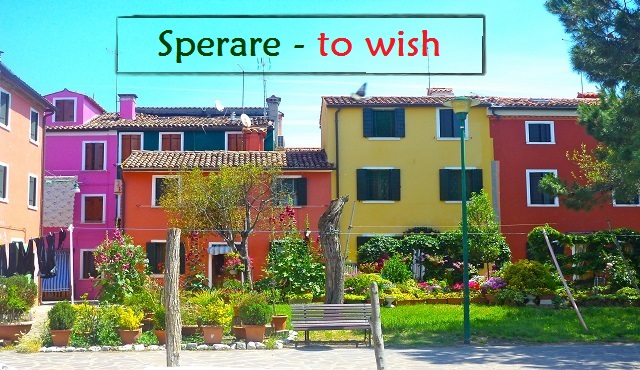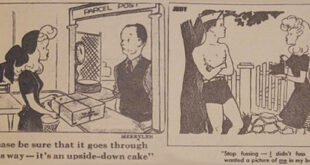When an Italian wants to describe a hope or a wish he has, either for himself or someone else, he must use the verb sperare, and this is the verb that will be the topic of our blog today.
Sperare works a bit differently from the “typical” Italian -are verb. To review what we’ve learned in our last blog about sperare:
- When using the verb sperare to express a hope or a wish one person or a group has for themselves, sperare must be followed by the preposition “di”.
- “Di” will often be followed by a verb in the infinitive form (to see, to start, etc.), which will start the phrase that follows to describe the hope or wish.
| Sperare + di + infinitive verb |
So, “I hope…” or “I wish…” would be, “Io spero di…” But, of course, we leave out the subject pronoun in Italian, so the phrase becomes, “Spero di…” “We hope…” or, “We wish…” would be, “Speriamo di…”
Or, one can just say, “Speriamo!” for, “Let’s hope so!” or, “Let’s wish!” in order to express a hope or wish that is shared with someone else.
Below are listed important Italian holidays and some common phrases that Italians use to wish each other “happy holidays”. We will learn how to use the verb sperare for our holiday wishes in the next section.
| Vigilia di Natale | Christmas Eve |
| Natale | Christmas |
| Buon Natale! Buone Feste! |
Merry Christmas! Happy Holidays! |
| Auguri di buon Natale! | Best wishes for a merry Christmas! |
| Tanti Auguri! / Auguri! | Best wishes! |
| Il biglietto di auguri Natalizi Regalo di Natale “Spero di ricevere un buon regalo di Natale dal mio fidanzato quest’anno.” |
Christmas greeting card Christmas gift “I hope/wish to receive a wonderful Christmas gift from my boyfriend this year.” |
| L’ultimo dell’anno | New Year’s Eve |
| La notte di San Silvestro | December 31st is the feast day of San Silvestro for the Catholic church. |
| Capodanno | New Year’s Day |
| Buon anno nuovo! Buon anno! |
Happy New Year! (used most often) |
| Felice anno nuovo! | Happy New Year! |
| Epifania | Catholic church holiday, which celebrates when “Wise Men” visited the baby Jesus. In Italy, gifts are exchanged on this day. Italian tradition holds that a friendly witch, La Befana, brings gifts to children on this day, although Santa Claus is also celebrated. |
Now that we are familiar with Italian end-of-the-year holidays and greetings, let’s go on to see how sperare can help us to express our good wishes. A short review is necessary from our previous blog as a reminder that…
- When one uses the verb sperare to express a hope or a wish he has for someone else or something else, he must follow the verb with the conjunction “che”, which means “that”. In fact, the word “che” can never be left out of an Italian sentence of this type and must be used to link the two phrases!
- “Che” will then be followed by a verb in the subjunctive mood, which will start the phrase that follows to describe this hope or wish.
| Sperare + che + subjunctive present tense verb |
Just what is the “subjunctive mood”? The subjunctive mood is the type of verb form that Italians use to express a wide range of emotions, such as hopes and wishes.
In order to express our good wishes for the holidays, we must first review the commonly used present tense form of the subjunctive mood for the verb avere, which means “to have”.
Che is included in parentheses in the first column of our table below as a reminder that these verb forms are typically introduced with the conjunction che. Also, make sure to include the subject pronoun in your sentence after che for clarity, since the singular verb forms are identical. The stressed syllables have been underlined for you.
Practice the subjunctive verbs out loud by saying che, the subject pronoun and then the correct verb form that follows!
| Avere – to have Present Subjunctive Mood |
||
| (che) io | abbia | I have |
| (che) tu | abbia | you (familiar) have |
| (che) Lei (che) lei/lui |
abbia | you (polite) have she/he has |
| (che) noi | abbiamo | we have |
| (che) voi | abbiate | you all have |
| (che) loro | abbiano | they have |
Phrases of Good Wishes Using “Avere” in the Present Tense Subjunctive Mood
Example phrases that use avere (to have) in the subjunctive mood to express good wishes are listed below. Many of these phrases are a good way to end a conversation before departing a friend’s company. These phrases are also commonly used to sign off emails to family and friends in order to express hopes for a good week or weekend.
You will notice that for the phrases in the first column of the list below, the Italian verb passare, which in these cases refers to “passing time” or “spending time,” is used. In English, the verb “to have” is used instead in these situations, so we must “think in Italian” in order to remember the proper Italian phrase!
Also, notice that the English translation is the same for the present tense and the Italian subjunctive forms used in the sentences below.
| Present Tense Phrase | Present Tense Subjunctive Phrase | ||
| Passa una buona settimana! | Have a good week! | Spero… che tu abbia una buona settimana. | I hope that you have a good week! |
| Passa un buon fine settimana! | Have a good weekend! | Spero… che tu abbia un buon fine settimana. | I hope that you have a good weekend! |
| Buona giornata.
Buona serata. |
Have a good day.
Have a good evening. |
Spero… che tu abbia una buona giornata/ buona serata. | I hope that you have a good day/evening. |
Finally, in the last example table, we will provide Italian phrases that can be used to express good wishes for the winter holidays! In later blogs, we will discuss the subjunctive endings for passare and fare. For now, just remember the endings to use in these often-used phrases of good wishes for the holiday season!
| Present Tense Phrase | Present Tense Subjunctive Phrase | ||
| Buon Natale! | Merry Christmas! | Spero che tu passi un buon Natale.
Spero che voi passiate un buon Natale. |
I hope that you have a merry Christmas!
I hope that you all have a merry Christmas! |
| Buone feste! | Happy holiday! | Spero che tu faccia buone feste!
Spero che voi facciate buone feste! |
I hope that you have happy holidays!
I hope that your holidays are happy! I hope that you all have happy holidays! I hope that your (to a group) holidays are happy! |
| Buon anno! | Happy New Year! | Spero che tu abbia un buon anno!
Spero che voi abbiate un buon anno! |
I hope that you have a happy New Year!
I hope that you all have a happy New Year! |
Remember these phrases and the Italian subjunctive mood, and I guarantee you will use them to bring good wishes to your family and friends for the holidays and every day!
Buone feste!
 Fra Noi Embrace Your Inner Italian
Fra Noi Embrace Your Inner Italian








2 comments
Pingback: Benvenuto Natale! – Fra Noi
Pingback: The holidays in Italy – Fra Noi